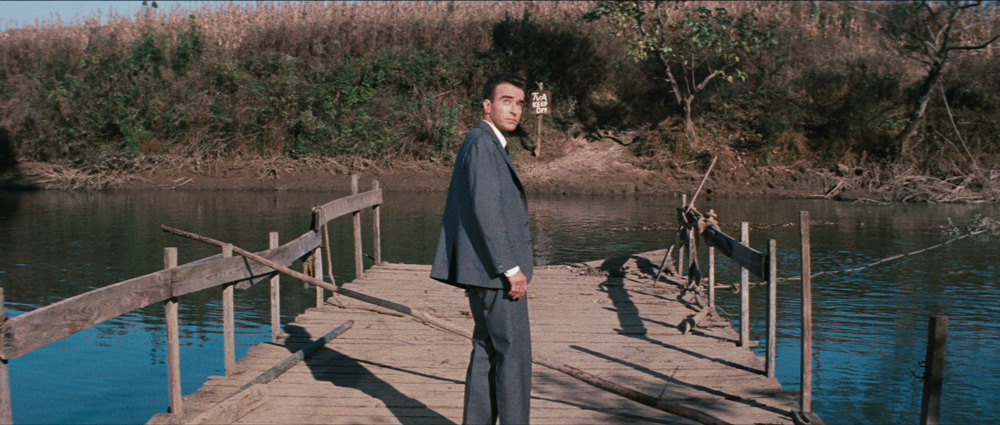Speaking with the French film critic Michel Ciment about his decision to name names in front of the House Un-American Activities Committee, Elia Kazan referred to his own feeling that there was “something repellant about what I did.” Yet, in that same conversation, he rationalized that, “When I began to make good films that were really progressive and really deep was after that.” This is the unfortunate paradox. Kazan’s talent was very real, and most of his signature masterpieces made after his capitulation to McCarthyism are recognized today without too much controversy: On the Waterfront (1954) for the obvious canonical reasons; A Face in the Crowd (1957) for its sharp indictment of mass-media enabled demagoguery; Splendor in the Grass (1961) for its inchoate psychosexuality and iconic casting of Warren Beatty opposite Natalie Wood. But 1960’s Wild River is still curiously underrated, which is unfortunate; if one still sees any point in the eternal struggle of separating art from artist, Wild River rates among Kazan’s very finest works.
Set in 1935, the film stars Montgomery Clift as Chuck Glover, a U.S. government employee sent from Washington to Garthville, Tennessee. Once there, his mission is to persuade Ella Garth (Jo van Fleet, playing a woman at least twice her age in the Hollywood equivalent of Fu Manchu makeup) to sell her family’s plot of land so that his agency, the newly-created Tennessee Valley Authority, can clear the area for the construction of a new dam, commissioned to both prevent the loss of further lives due to flooding in the valley and furnish citizens with a source of electricity. The matriarch refuses to sell, preferring to be washed away with her familial home rather than bend to the will of a so-called government. A battle of wills ensues, and its themes are beyond familiar: city versus country, tolerance versus tradition, progress versus ignorance, individual versus collective.
What’s interesting is that Clift’s stammering do-gooder is no match for the stubborn Garth family. Kazan deliberately sought to stack the deck so that Ella Garth would be the more sympathetic character. “I’d conceived of this film years before as homage to the spirit of FDR; my hero was to be a resolute New Dealer engaged in the difficult task of convincing ‘reactionary’ country people that it was necessary, in the name of the public good, for them to move off their land and allow themselves to be relocated,” he wrote in memoir A Life. “Now I found my sympathies were with the obdurate old lady who lived on the island that was to be inundated and who refused to be patriotic, or whatever it took to allow herself to be moved.”
Indeed, Ella’s fire-and-brimstone monologues about refusing to place a dollar value on her property—and by extension, her family and community—are hard to argue with. Less so is Glover’s contention that all workers, including all-but-indentured Black laborers who are paid far less than their white compatriots, should be paid the same regardless of the color of their skin. But who does he think he is, crossing into terra incognita and telling a bunch of strangers how to live their lives? A U.S. marshal tasked with forcibly removing the Garths will tell Glover: “I sorta hate to do this… I guess it all goes under the general heading of ‘progress’.”
Glover also falls haplessly in love with Ella Garth’s recently widowed granddaughter Clara (Lee Remick), a character of strong and pure presence despite being clearly traumatized. There’s trauma all over Glover too—not just because it’s Clift, but because Wild River is one of the films Clift made after he got into a life-shattering car accident in 1956 leaving a party at Elizabeth Taylor’s house. The accident disfigured his face and compounded his preexisting traumas forever, resulting in substance abuse problems that acting teacher Robert Lewis called “the longest suicide in Hollywood.”
Glover’s discussions with Clara are full of pregnant pauses and awkward silences, much like his doomed appeals to Ella and her sons. Every journey he makes to see the family on their island is a solitary one. Such longueurs give Wild River a curiously ambient texture and considerable melancholy for a studio picture. Cinematographer Ellsworth Fredericks’s use of CinemaScope gives the desiccated archipelago the kind of treatment typically reserved for desert squad formations or bank-breaking reenactments of historic battles. Early in the film, one of Ella’s adult sons cheerfully picks Glover up and hurls him over a cliff, down into the water; Kazan holds the frame and Clift pops his head up again after emerging, gasping, confirming the impossibility of a stuntman. You can see Fredericks and Kazan striving for greater verisimilitude years before New Hollywood aesthetics exposed the artifice of the studio system. But above all else, Wild River is a mood piece: elegiac and autumnal, it’s a meditation on inevitability, not of progress, but of death.
Wild River screens this evening, Aug 1, at Anthology Film Archives as part of the series “The World of Barbara Loden.”



